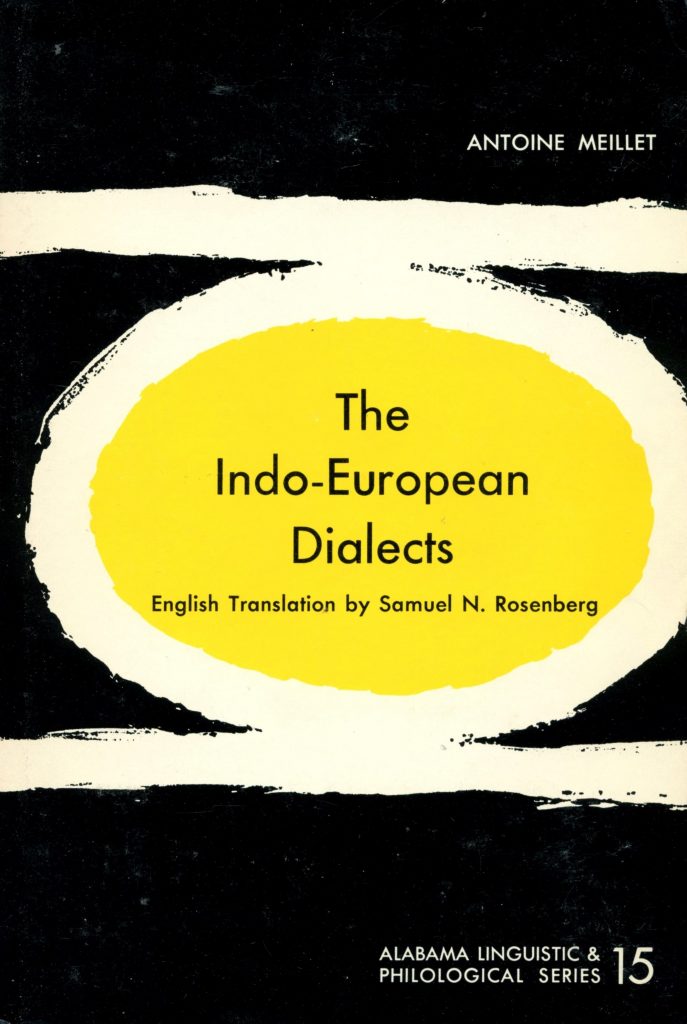
- Hardcover edition (1967)
- Antoine Meillet
- Translated by Samuel N. Rosenberg
- (Series: Alabama Linguistic and Philological Series, 15)
- University, AL: University of Alabama Press, 1967
- 208 pages
- Hardcover (This edition may have been out of print before an ISBN was assigned.)
- Paperback reprint (2006)
- Antoine Meillet
- Translated by Samuel N. Rosenberg
- Tuscaloosa, AL: University of Alabama Press, 2006
- 208 pages
- Paperback: ISBN-10 0-8173-5319-4
- Paperback: ISBN-13 978-0-8173-5319-3
- The contents of this reprint are the same as those of the 1967 hardcover edition.
- Image: Jacket of the 1967 edition
This translation of Antoine Meillet’s classic study remains useful for understanding the development and early differentiation of Indo-European dialects and languages.
From the jacket of the 1967 edition
Meillet’s Les dialectes indo-européens (1908; 2nd ed. 1922) is one of a rather small number of pre-World War I “classics” of philology that are still regarded as essentially valid in content by most scientific linguists of the 1960’s. Meillet’s study is still the standard work on its subject and still the most comprehensive treatment. . . . Hence, this translation was undertaken in order to restore to print an invaluable contribution to historical linguistics—not a work that is beyond criticism in all matters of detail and method, but one that has never been superseded and is not likely to be.
[This] translation takes into account all addenda included in Meillet’s Preface to the 1922 French edition; for the convenience of the reader, however, the translator has inserted them (labeled “add.”) at appropriate points in the body of the book[.]”
From Antoine Meillet, “Author’s Foreword to the Second Printing”
“To judge by our observations of all the ancient Indo-European peoples—the Celts no less than the ‘Aryans’ of India and Iran, the Germanic tribes and the Greeks, the Slavs as well as the Italic peoples—the elements that in prehistoric time composed the Indo-European ‘nation’ were loosely bound together and did not constitute a stable political unit. . . . Indo-European unity was national rather than political. And there is no reason to believe that any part of the ‘nation’ had a lasting, dominant influence over the other parts.”
Contents
- Translator’s Note
- Abbreviations
- Author’s Foreword to the Second Printing
- Author’s Prefatory Note
- Introduction
- I. Vocabulary of the Northwest
- II. Indo-Iranian
- III. Italo-Celtic
- IV. Balto-Slavic
- V. The Gutturals
- VI. The Vowels o and a
- VII. The Cluster *-tt-
- VIII. The Development of *ǝ
- IX. The Cluster *-wy-
- X. The Voiced Aspirated Stops
- XI. The Voiceless Aspirated Stops
- XII. The Sibilant *s
- XIII. The Germanic and Armenian Consonant Shifts
- XIV. The Augment
- XV. The Perfect
- XVI. The Present Suffix *-ye-
- XVII. A Few Noun Suffixes
- XVIII. Case-endings with *-bh- and *-m-
- XIX. The Genitive Plural of *-ā-
- XX. Some Observations on Vocabulary
- Conclusion
- Notes
- Index verborum
- Index nominum
